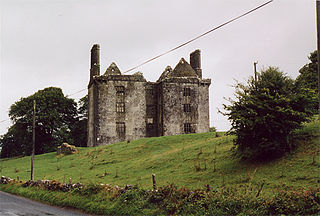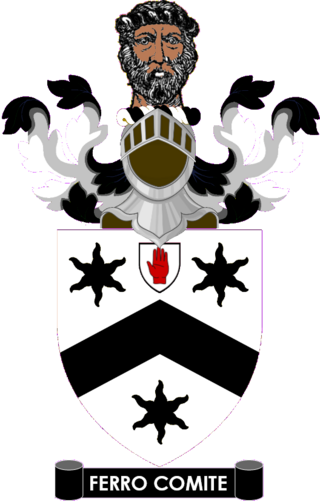Related Research Articles
Baron Killearn, of Killearn in the County of Stirling, is a title in the Peerage of the United Kingdom. It was created in 1943 for the diplomat Sir Miles Lampson. He was the second son of Norman Lampson, youngest son of Sir Curtis Lampson, 1st Baronet, of Rowfant. Lord Killearn's eldest son, the second Baron, succeeded his second cousin once removed as fourth Baronet in 1971. On his death the titles passed to his half-brother, the third and present holder of the barony and baronetcy.
There have been three baronetcies created for people with the surname Cayzer, each in the Baronetage of the United Kingdom and each for members of the same family.

There have been three baronetcies created for persons with the surname Croft, one in the Baronetage of England and two in the Baronetage of the United Kingdom. All three creations are extant as of 2008.
There have been four baronetcies created for persons with the surname Leslie, one in the Baronetage of Nova Scotia, one in the Baronetage of Ireland, one in the Baronetage of Great Britain and one in the Baronetage of the United Kingdom. Three of the creations are extant as of 2010.

There have been two baronetcies created for persons with the surname Burke, both in the Baronetage of Ireland. As of 2014 one creation is extant.

There have been four baronetcies created for persons with the surname Sykes, two in the Baronetage of Great Britain and two in the Baronetage of the United Kingdom. Three of the creations are extant as of 2008.
There have been two baronetcies created for persons with the surname MacLeod, both in the Baronetage of the United Kingdom. As of 2014 both titles are extant.
There have been three baronetcies created for persons with the surname Bellingham, one in the Baronetage of England, one in the Baronetage of Ireland and one in the Baronetage of Great Britain. As of 2014 one creation is extant.
There have been five baronetcies created for persons with the surname Hill, one in the Baronetage of Nova Scotia, one in the Baronetage of Great Britain, one in the Baronetage of Ireland and two in the Baronetage of the United Kingdom. Three of the creations are extant as of 2008.
There have been nine baronetcies created for persons with the surname Moore, two in the Baronetage of England, one in the Baronetage of Ireland, two in the Baronetage of Great Britain and four in the Baronetage of the United Kingdom. As of 2014 two creations are extant and one is considered dormant.
There have been three baronetcies created for persons with the surname Noble, all in the Baronetage of the United Kingdom.
There have been two baronetcies created for persons with the surname Salt, both in the Baronetage of the United Kingdom. Both titles are extant as of 2007.

The Worsley family is an English family that is derived from Sir Elias de Workesley, a Norman knight who was a youth at the time of the Norman conquest. He later accompanied Duke Robert II of Normandy on the First Crusade and was buried at Rhodes.

The Bedingfeld, later Paston-Bedingfeld Baronetcy, of Oxburgh in the County of Norfolk, is a title in the Baronetage of England. It was created by Charles II of England in recompense for the family's losses in the Royalist cause during the Civil War and Interregnum years. The Bedingfelds are said to descend from 'Ogerlis', a Norman, who, in 1100, held land at Bedingfield, Suffolk. His descendant, Edmund Bedingfeld, married Margaret, daughter and heiress of Sir Robert Tuddenham, bringing to her husband estates including the manor of Oxburgh, near Swaffham, Norfolk.
There have been four baronetcies created for persons with the surname Musgrave, one in the Baronetage of England, one in the Baronetage of Nova Scotia, one in the Baronetage of Ireland and one in the Baronetage of the United Kingdom. As of 2014 two of the creations are extant.
There have been two baronetcies created for persons with the surname Mackworth, one in the Baronetage of England and one in the Baronetage of Great Britain. One creation is extant as of 2008.
There have been three baronetcies created for persons with the surname Dryden, one in the Baronetage of England and two in the Baronetage of Great Britain. Two of the creations are extant and are joined under a single holder since 1874.

There have been three baronetcies created for persons with the surname Style, one in the Baronetage of Ireland and two in the Baronetage of England. Two of the creations were in favour of the same person. As of 2014 one creation is extant.

The Mordaunt Baronetcy, of Massingham Parva in the County of Norfolk, is a title in the Baronetage of England. It was created on 29 June 1611 for Lestrange Mordaunt, who had earlier distinguished himself in the Wars of the Low Countries during the reign of Elizabeth I. The fifth, sixth, seventh and eighth Baronets all represented Warwickshire in the House of Commons. The ninth and tenth Baronets sat as Members of Parliament for Warwickshire South.

There have been two baronetcies created for persons with the surname Goring, both in the Baronetage of England. The second creation came into the family through a special remainder in the patent creating the baronetcy. Only the latter creation is extant as of 2008.
References
- Kidd, Charles, Williamson, David (editors). Debrett's Peerage and Baronetage (1990 edition). New York: St Martin's Press, 1990.
- Leigh Rayment's list of baronets – Baronetcies beginning with "N"